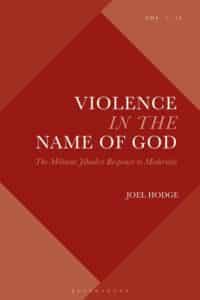
Violence in the Name of God: The Militant Jihadist Response to Modernity by Joel Hodge, Bloomsbury Academic, 2020.
This work is the latest in Bloomsbury’s series titled: Violence, Desire and the Sacred to which scholars of the thought of René Girard (1923-2015) have contributed.
It expounds a number of theses: (i) that violence is a manifestation of the unrestrained and escalating dynamics of desire and rivalry in modernity, (ii) that violence is a response to the unveiling and discrediting of sacred violence, and (iii) that for Jihadists violence is a form of worship. The entire work is based on René Girard’s Mimetic Theory that is usually labelled an example of anthropological philosophy.
The author very lucidly outlines Girard’s theory in his first chapter. The major principles of the theory are the following three propositions:
1. Human desire is imitated, that is, it is stimulated by others.
2. Human cultures use scapegoats or victims to resolve mimetic rivalry and violence in order to create and maintain cultural unity.
3. Biblical revelation reveals the innocence of the victim and the nature of the scapegoat mechanism and charts a positive way for structuring human desire in divine self-sacrificial love.
The third of these principles unites anthropology with theology since Girard argues that in the various epic dramas that unfold in the Bible, God always comes out on the side of the innocent victim rather than affirming the violence and scapegoating behaviour of the mob.
The God of the New Testament is also revealed to be someone who affirms loving forgiveness and self-giving service.
Hodge quotes Girard to the effect that: “Love is the only true revelatory power because it escapes from, and strictly limits, the spirit of revenge and recrimination that still characterises the revelation in our world…”
The Jewish and Christian Abrahamic traditions are therefore presented in quite a positive light by Girard because he views their overall effect on world history as a barrier to scapegoating behaviour. Abraham did not kill his son Isaac. Abraham drew a kind of ‘metaphysical’ line in the sands of history. The Islamic tradition, however, is more ambivalent.

It can be construed as an offshoot of the religion of Abraham but the jury is ‘out’ over how contemporary violence in the name of the Islamic religion fits within the tradition of Abraham and within the mimetic theory of Girard. Hodge’s book is therefore an attempt to engage with these issues.
Having outlined Girard’s general theory in the first chapter, Hodge then moves onto an account of Girard’s theory about violence in modernity.
This can be summarised by the thesis that the predominant cause of contemporary forms of violence is “desacralisation” and the rise of the secular state conducting total warfare.
Here the watershed moments were the French Revolution and the rise of Napoleon.
Chapter three then narrows the optic to a focus on “Islamic modernity” in countries with a Muslim-majority and the rise of violent movements in response to this secular movement within Islam.
Particular attention is given to Sunni jihadism such as that which gravitates around Egyptian groups.
This third chapter is a very “readable” history of Islamic social history from the fall of the Ottoman Caliphate in 1924 to the present.
Chapters four and five offer an account of how jihadists have construed violence as a sacred act and the various efforts that governments have taken to contain this. The rise of the notion of the Islamic martyr is also addressed.
Chapters six to nine inclusive also focus on the theological tropes in what Hodge calls sacred Jihadist totalitarianism.
Hodge observes that violence has a tendency to backfire on jihadist groups. The data shows that populations will side with non-violent alternative leadership if it is offered to them.
The final chapter argues that the only really effective solution to this problem is for the other Abrahamic religions to get their acts together and offer alternative non-violent accounts of the sacred.
He specifically mentions the ‘historic witness of the Abrahamic faiths to self-giving forms of charity (eg. hospitals, schools for the poor, welfare networks) that gave a clear example of how to pursue the common good’.
An appendix follows the final chapter that offers a glossary of terms associated with Girard’s theory. These include: desire, doubling, mediation, metaphysical desire, surrogate victimage and scapegoating.

One does not have to be a true believer in the thought of René Girard to find the material in this book interesting.
As someone who has found keeping up with all the different groups that get mentioned in the newspapers, knowing which ones are Saudi and which ones are Egyptian, which ones Sunni and which ones non-Sunni, something of a current affairs challenge, I found Hodge’s explanations about the origins of the different groups and their ideas extremely valuable.
He has also managed to present the material in a way that makes for easy reading. One is mercifully spared the academic jargon one sometimes encounters in the field of sociology.
Hodge presumes his readers are educated but does not assume anything like an advanced degree in Islamic studies.
